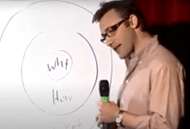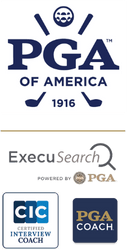As with the previous topics, for Article 11 of the Paradox Series, we unpacked “The Looking Paradox,” and considered how it applied to the golf industry. Specifically, the clarity came from this idea that what we are looking at truly matters, “If I’m not careful, I can also miss the(se) key facts, data or perspectives that just might be key in helping me recognize that I can see something differently, I can change, I can grow and I can be rewarded…but only if I intentionally STOP LOOKING FOR ONLY WHAT I’M LOOKING FOR.”
As we wrap up this series, it seems only fitting that we should land on a deeper understanding of The Pro’s Performance Paradox. Note, this is not one of which I can credit Sahill Bloom or Nassar Taleb for. Instead, it’s based on the somewhat challenging “paradoxical view” of our professional why, what drives us, what is our purpose or other similar phrases.
To start, let’s “Start With Why” (and understand the importance of this concept). In 2009, Simon Sinek set many of us on a path with his iconic TedTalk of the same name. If you haven’t seen it, please check it out here: Start with Why: How Great Leaders Inspire Action (Simon Sinek). Key moments or thought-provoking statements from that “talk” include:
- The Golden Circle (Why, How, What)
- Why do you get out of bed in the morning, and why should anyone care?
- People don’t buy what you do, they buy why you do it.
- Success/sales/revenue and similar are a result of having the right why (they are not a why on their own).

Based on Sinek’s book Start With Why (and the TedTalk above) and so many other relevant authors, researchers and business leaders, it has become the common belief that “professional purpose” (aka our why) is a key to finding success, fulfillment, meaning and more in our careers. It’s this understanding about oneself that helps us, as the “pilot for our career journey” ensure we are:
- In the right career pathway (for PGA professionals, that is golf operations, executive management or teaching/coaching)
- Able to identify and target the best work context/situation for us as we evaluate factors like: facility type, team culture, ownership type and similar
- Not only in the right career path, but in the right role (per Jim Collins, author of Good to Great, “On the right bus, and not only that, in the right seat on the bus…”)
- Gaining confidence, competency and comfort (in terms of belonging) in the short and long term; specifically, this is in the role we end up focusing on
- Finding good career result(s) (per Sinek, fully based on our why to drive compensation, job stability and job satisfaction)
Many of you who know me are aware that I have been sharing this belief for more than 12 years in my work as a PGA Career Coach/Consultant. The points above are still relevant to me, they’re still applicable to my career and, in my opinion, they should be to yours too. This will not change, but in light of looking at it with a “paradoxical lens,” we can consider more.

First, while on Instagram, I came across this post by Marcus Buckingham, where he shared “the myth of purpose” in our careers. Further, he stated that “…WHY you are doing your job is not enough if the WHAT is tearing you down.”
If you click on the link to see the post above, Buckingham states that, “…We’re often told to start with why, as though if you find your purpose, you’ll be able to live a full and thriving life…yet (in my research) on resilience…on engagement at work, the two least engaged and least resilient professions in the world are teachers and nurses…” Whoa! Hold on! That seems like a paradox to the powerful and true perspectives noted above based on Sinek and Start With Why. As usual, I have some solid takeaways from this post including:
- Our Why/Our Purpose is important, but on its own, it falls short in helping us maintain engagement, resilience under stress, productivity and effectiveness
- Purpose really matters but, as Buckingham asserts, “when push comes to shove…it doesn’t matter what your why is, if the what you’re doing every day doesn’t energize you.”
After watching it several times, I had to learn more about Marcus Buckingham. He’s a Psychometric Analyst, a “Strength’s Revolutionist” and author of Now, Discover Your Strengths, First, Break All the Rules and StandOut 2.0: Assess Your Strengths, Find Your Edge, Win at Work. Watch this summary video on the book for a quick, but worthwhile, review.
With all of that in mind, here are some more applications for consideration.
- Start With Why—But only having the right why is not enough…what we are doing matters nearly as much or it matters in a practical sense. It’s the “what we’re doing” that actually energizes us, actually fulfills and/or fuels us…not our why (or our purpose).
- Where your resilience comes from is important (otherwise, it has little value). Because nurses, who would seem to have, as Buckingham said, “the clearest form of purpose one could imagine…nurses are trying to help people get better who are sick. Who couldn’t rally around that purpose?” And yet, nurses appear to have a form of PTSD that is 2x more what veterans have coming back from war zones. Why? Perhaps it is not only what they are doing, it is seeing (or not seeing) the results of what they are doing. Nurses are wonderful people, but it must be hard knowing that the person you’re helping is 1) probably only getting better temporarily, 2) not really getting better because they’re too far along or they won’t change behaviors, or 3) there’s always another sick person to take care of or things like that. If one feels that way, it would seem that “even the doing” (e.g. activities of the position, maybe that were interesting, exciting, etc. in the beginning, but not really now) tends to lead to burnout.
Where does resilience come from in our work? First off, we’ve learned that resilience isn’t a fixed trait but a skill that can be cultivated. By strengthening these areas, individuals can better navigate the complexities of work and productivity with determination and adaptability.
- Internal Development: Some research indicates it is “built” through small gains, meaningful “make a difference” results and other “wins” that build up our “Self-Efficacy” view of ourselves, our work and so forth. These wins place meaningful “bricks” in our foundation to build our confidence in our own ability to handle challenges and respond to them with persistence and adaptability. Notably, this confidence is “the real thing” and not put on confidence that displays itself as arrogance.
- Our Mindset: Part of this also includes our mindset (the intentional one we have based on choice), most often known as a growth mindset. This starts with a belief that abilities, like resilience, can be developed…and that challenges are “good for us” as they give us opportunities to learn, opportunities to excel and grow our abilities to persevere.
- Our Self-Awareness/Emotional Regulation: As with our mindset, it is in the challenges, (especially with people when we are feeling attacked, emotionally under the gun or similar) where our ability to manage stress, adapt to setbacks, and maintain emotional equilibrium is forged, strengthened and developed. When we manage or regulate our response to stress, we enhance resilience and gain confidence to do it more in the future.
- External Development: Often the “external is what happens to us,” but there is more. We can have a role in it, versus being a victim of what happens to us. Here are a few areas where we can express our “locus of control” (that is the space where what we can control converges with the areas we are passionate about, skilled in and similar) outside of ourselves:
- Social Connections: Supportive relationships provide encouragement, perspective, and practical help, bolstering resilience.
- Mentorship and Guidance: Learning from others who have overcome similar challenges offers strategies and reassurance. How do your mentors fare in this area? If they’re not so great, consider finding mentors who are strong in it.
- Healthy Work Environment: No matter how many strong mentoring relationships one has, being in a toxic or unhealthy work environment can really hurt you. Instead, being part of a team and culture that values collaboration, flexibility, and well-being promotes sustained effort and recovery.
Application and Resources: Besides getting a copy of Buckingham’s books (see above), there are other resources that I can share for your consideration as you approach a new year, a new season and/or a new phase of your career. These include:
- Take and Apply Strengthsfinders (CliftonStrengths) by Gallup | The StrengthsFinder assessment (now called CliftonStrengths) offers valuable results that can significantly impact personal and professional growth. Here are some key benefits: Start with getting Your Strengthsfinders Top 5 Report –Go here to get it for only $25!
- Increased Self-Awareness | Identifies your top strengths (out of 34 possible themes), providing insight into what you naturally excel at. Helps you understand your unique ways of thinking, behaving, and interacting with others. Enables you to articulate your strengths clearly, which is useful for career development or personal reflection.
- Enhanced Productivity | Encourages focusing energy on tasks aligned with your strengths, leading to better efficiency and performance. Reduces time spent on less productive or draining activities by highlighting areas where you’re naturally less inclined to excel.
- Better Career Alignment | Offers guidance on how to leverage your strengths in your current role or find roles that better fit your talents. Improves job satisfaction by aligning tasks and responsibilities with what you do best.
- Improved Team Dynamics | Teams can use StrengthsFinder to understand individual contributions and foster complementary collaboration. Reduces conflict by highlighting differences as strengths rather than weaknesses. Encourages appreciation of diverse talents within the team, creating a more inclusive and effective work environment. (You will be a better colleague.)
- Increased Confidence | Recognizing and embracing your strengths boosts self-esteem and empowers you to tackle challenges. Reinforces the idea that focusing on strengths—not just fixing weaknesses—is a valid and effective approach to growth.
- Personal Development | Provides a framework for setting goals that align with your natural abilities. Encourages leveraging strengths to overcome challenges or compensate for weaknesses. Helps in identifying areas for further growth and how to develop complementary skills.
- Leadership Development | Helps leaders understand how their strengths shape their leadership style. Facilitates more effective delegation by matching team members’ strengths with specific tasks. Enhances emotional intelligence by fostering empathy and understanding of others’ unique contributions.
- Cultural and Organizational Benefits | Creates a strengths-based culture where individuals feel valued for their unique contributions. Improves employee engagement and retention, as people feel empowered to work in ways that align with their strengths.
- Actionable Strategies | Provides specific, personalized recommendations for applying strengths in everyday life. Encourages continual improvement by focusing on developing strengths further, rather than obsessing over weaknesses.
I value Strengthsfinders because it helps us focus on “what’s right with people instead of what’s wrong.” What a difference in perspective. With that change in viewpoint, it can be transformative in how individuals and teams approach challenges, collaboration, and growth.
A Follow Up for You:Creating a Strengthsfinders “Mind Map” to Help With Purpose, Engagement & Resilience in Your Career
If you want to get on discovering your Strengthsfinders and how you can apply them to your career, especially for that powerful combination of “Your Why/Your Purpose” + “Your Strengths/What Inspires the Activities You Do” let’s talk soon. As I’ve been saying in each of these articles in the Paradox Series: What can you do, think about, or start working on to make your life, your career better in the coming year? Don’t know…start looking and thinking about it…and start now.
Thanks for taking the time to read this article. If you have a story to share, an issue you’re facing professionally or similar, please reach out to me when you can. If you are seeking any help with your career or similar, please click on the “Book an Appointment on Monte’s Calendar” link below.

Monte Koch, PGA Certified Professional, CIC
[email protected] | 206.335.5260
PGA of America | PGA Career Services | Career Coach & Consultant
Certified Interview Coach | Certified Predictive Index Practitioner
Based in South King County, WA